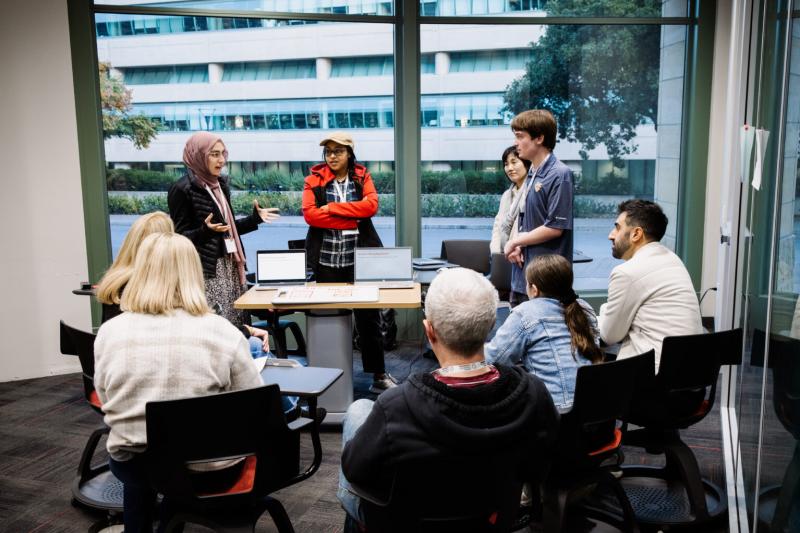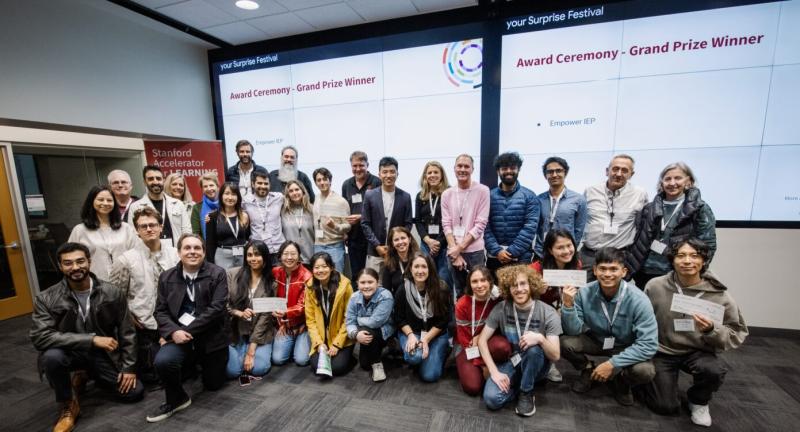
Ready ... set ... solve!
What happens when educators, technologists, students, families, and community partners work together using AI technology to create solutions to educational challenges? Hint: it’s a winning combination.
A hackathon is a collaborative event where people work together to solve a problem or create new ideas. True to its name, the annual Stanford Accelerator for Learning (SAL) AI + Learning Differences Symposium and Hackathon assembled educators, technologists, students, families, and community partners for a December event to produce competitive, real-world solutions. The lived experiences of participants with learning differences and inclusion by design were central to the event, as was the collaborative partnership of the Hackathon sponsor, the Alana Foundation.
"Collaborating with the Alana Foundation was transformative in making the symposium and hackathon truly inclusive and global,” explains event organizer Associate Professor Chris Lemons. “Their deep commitment to equity ensured that diverse voices—especially those of learners with disabilities—were not just included but centered. Together, we created a space where innovation was driven by real-world needs, bridging research, technology, and lived experiences to shape solutions that matter."
The 2024 hackathon brought together 21 interdisciplinary teams to prototype AI-driven solutions for learning differences. Participants collaborated to identify key challenges and design innovative, actionable tools, hacking at the margins of traditional education systems. Industry mentors from leading technology companies—including GitHub, Google, Microsoft, and Unity—alongside Stanford researchers provided guidance and support. A panel of global judges reviewed the projects and recognized winning solutions for their impact and ingenuity. Standout projects from the day included:
FeelLink – This AI-driven adaptive learning platform helps young adults strengthen social skills and emotional intelligence through personalized, immersive, interactive scenarios.
Maestra – Through reactions to the environment and typed or spoken commands, this AI tool can automatically contact auxiliary support, provide real-time advice on student engagement, schedule appointments, coordinate with specialists, or collaborate with other tools to help teachers support diverse learners in their classrooms.
BCBAwesome – Tackling the critical shortage of ABA (applied behavior analysis) therapists, this AI solution assists human therapists in delivering better support through real-time coaching and guidance customized to the individual’s experience.
Roleability – An AI-powered role-playing game that simulates social scenarios, Roleability offers personalized practice and feedback to help individuals with learning differences navigate social interactions while building empathy, confidence, and adaptability.
EmpowerIEP ‒ Claiming the grand prize as the winning project for the day, this groundbreaking AI tool empowers parents to become stronger advocates for their children with learning differences by simplifying and demystifying the individualized education plan (IEP) process.

GSE alumnus Chinat Yu, MS ’24, who co-organized the event with SAL Executive Director Isabelle Hau, Associate Professor Chris Lemons, and Professor Elizabeth Kozleski, was pleased with the outcome of the event, expressing gratitude for the commitment and collaboration of all the stakeholders. “From brainstorming to building,” Yu said, “it was incredible to see the diverse group of hackers, mentors, and judges come together to bring innovative ideas to life. This event was a true testament to what can be achieved by combining expertise, passion, and teamwork.” Equally impressed was the event sponsor, the Alana Foundation, whose guiding mission statement—A better world for children is a better world for everyone—contributed financial support and participated in judging projects.
“It was a pleasure to support and collaborate with the Stanford Accelerator for Learning's AI + Learning Differences Symposium and Hackathon to explore and build ways of engaging diverse communities—developers, educators, researchers, people with disabilities, families—in creating AI-powered solutions that ensure all children can benefit,” said Pedro Hartung, CEO of Alana Foundation. “The energy and engagement generated by the event were truly inspiring, as was the development of this methodology to spark similar initiatives around the world.”
This event was presented by the Stanford Accelerator for Learning and was made possible through the generosity of the Alana Foundation and in collaboration with the CAST, the Children’s Health Council (CHC), and the Stanford Institute for Human-Centered Artificial Intelligence (HAI).
